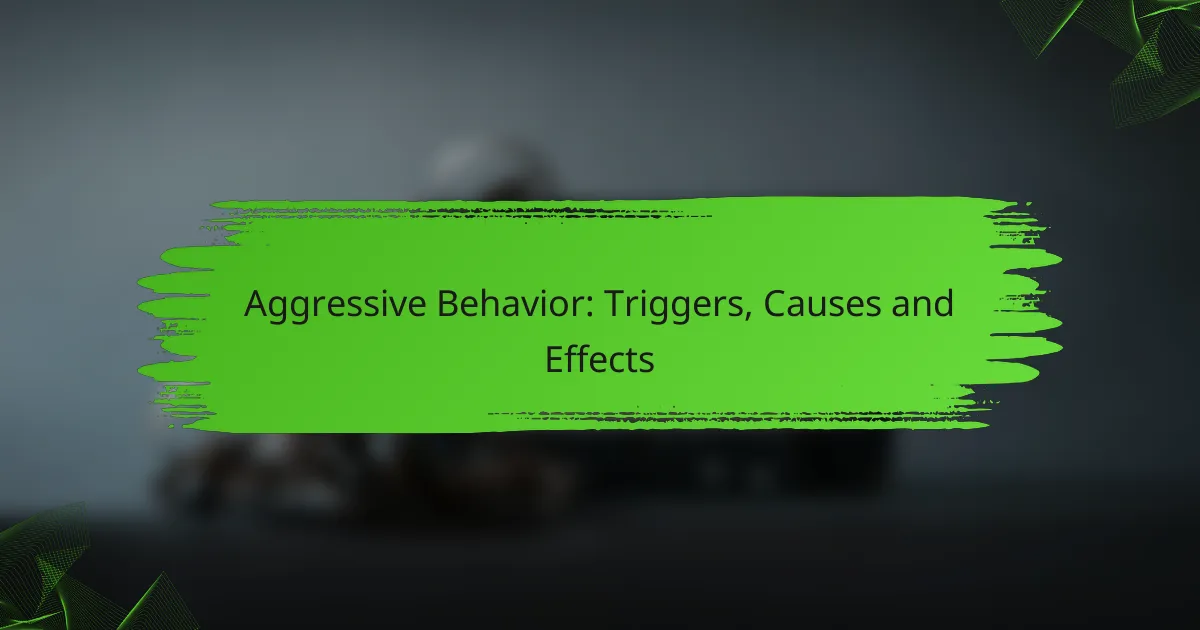Anger management techniques are essential for individuals seeking to control their emotional responses in challenging situations. By employing effective strategies, individuals can enhance their emotional regulation, improve relationships, and foster overall well-being. Professional guidance further supports this process, offering tailored approaches to help individuals understand their triggers and develop healthier coping mechanisms.

What are effective anger management techniques?
Effective anger management techniques help individuals control their emotions and reactions to anger-inducing situations. These strategies can improve emotional regulation, enhance interpersonal relationships, and promote overall well-being.
Cognitive Behavioral Therapy
Cognitive Behavioral Therapy (CBT) is a structured approach that helps individuals identify and change negative thought patterns that contribute to anger. By recognizing triggers and reframing thoughts, individuals can develop healthier responses to frustration and irritation.
CBT often involves working with a therapist to practice new skills in real-life situations. This method can be particularly effective for those who struggle with chronic anger issues, as it provides tools to manage emotions constructively.
Mindfulness Meditation
Mindfulness meditation encourages individuals to focus on the present moment, which can reduce feelings of anger and stress. By practicing mindfulness, people learn to observe their thoughts and emotions without judgment, allowing them to respond rather than react impulsively.
Regular practice can lead to increased emotional awareness and improved self-control. Even short sessions of mindfulness, lasting just a few minutes, can help cultivate a calmer mindset over time.
Deep Breathing Exercises
Deep breathing exercises are simple yet effective techniques for managing anger. By taking slow, deep breaths, individuals can activate their body’s relaxation response, which counteracts the physiological symptoms of anger.
A common method is the 4-7-8 technique: inhale for four seconds, hold for seven seconds, and exhale for eight seconds. Practicing this for a few minutes can help reduce immediate feelings of anger and promote a sense of calm.
Physical Exercise
Engaging in physical exercise is a powerful way to manage anger. Activities like running, swimming, or even brisk walking can release endorphins, which improve mood and reduce stress levels. Regular exercise can also enhance overall emotional resilience.
Even short bursts of activity, such as a 10-minute walk, can help alleviate feelings of anger and frustration. Finding an enjoyable form of exercise can make it easier to incorporate into daily routines.
Anger Journaling
Anger journaling involves writing down thoughts and feelings related to anger, which can help individuals process their emotions. This technique allows for reflection on triggers and patterns, fostering greater self-awareness and understanding.
To start, set aside a few minutes each day to write about experiences that provoke anger. Over time, this practice can reveal insights into emotional responses and help develop strategies for managing anger more effectively.
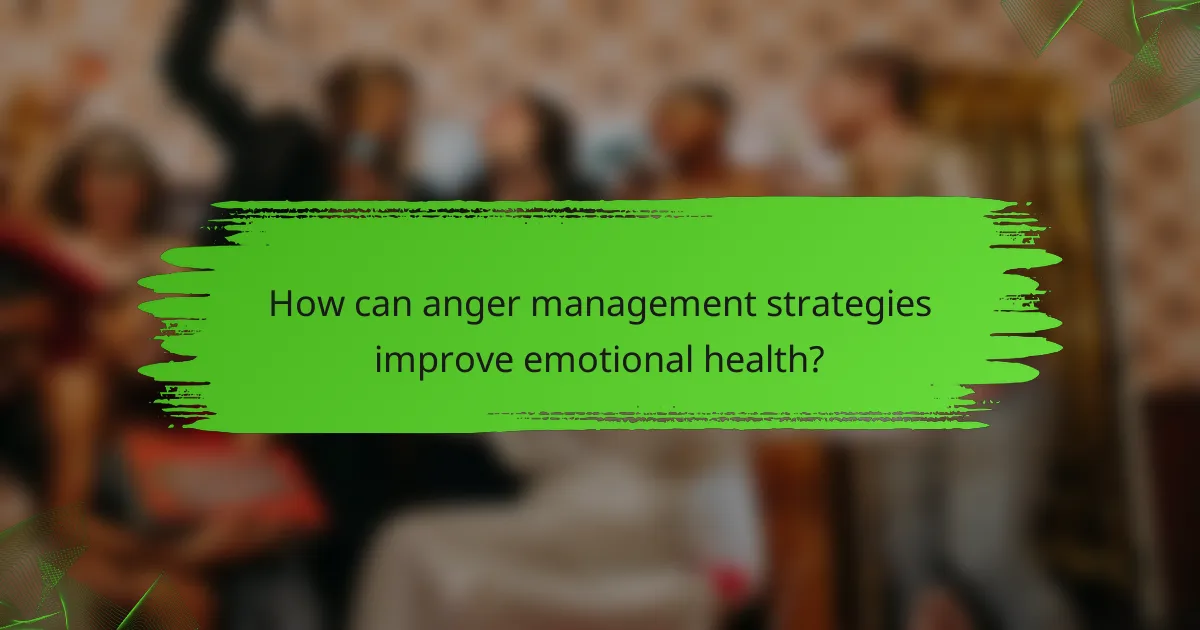
How can anger management strategies improve emotional health?
Anger management strategies can significantly enhance emotional health by providing individuals with tools to understand and regulate their emotions. These techniques help in reducing negative feelings and promoting a more balanced emotional state.
Reduces Stress Levels
Implementing anger management strategies can lead to lower stress levels by teaching individuals how to respond to triggers without escalating their emotions. Techniques such as deep breathing, mindfulness, and physical exercise can help mitigate stress responses.
For example, practicing deep breathing for a few minutes when feeling angry can lower heart rate and promote relaxation. Regularly engaging in these techniques can create a habit that effectively reduces overall stress.
Enhances Communication Skills
Anger management strategies improve communication skills by encouraging assertive expression rather than aggressive outbursts. Learning to articulate feelings calmly and clearly can foster better understanding in conversations.
For instance, using “I” statements, such as “I feel frustrated when…” can help convey emotions without blaming others, leading to more productive discussions. This approach not only clarifies one’s feelings but also invites collaboration in resolving conflicts.
Improves Relationships
By managing anger effectively, individuals can build healthier relationships. Anger management helps reduce conflicts and misunderstandings, allowing for more positive interactions with family, friends, and colleagues.
For example, couples who practice anger management techniques often report improved communication and decreased arguments. This can lead to stronger bonds and a more supportive environment, enhancing overall relationship satisfaction.
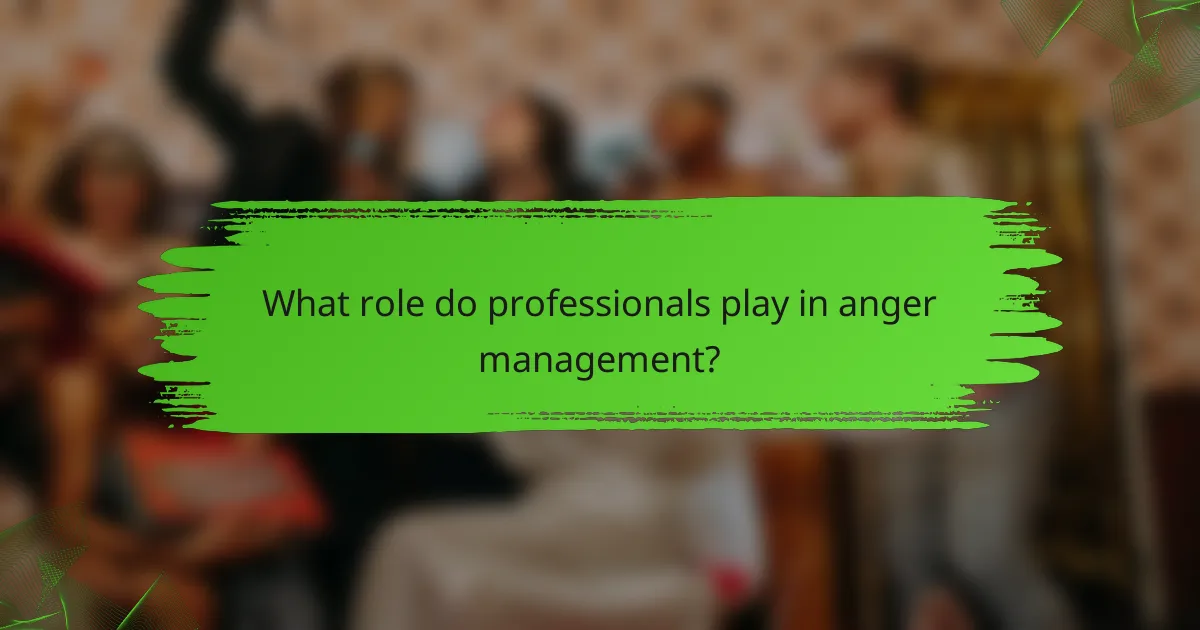
What role do professionals play in anger management?
Professionals play a crucial role in anger management by providing guidance, support, and structured techniques to help individuals understand and control their anger. They offer tailored strategies that address personal triggers and coping mechanisms, making the process more effective.
Therapists and Counselors
Therapists and counselors specialize in helping individuals explore the underlying causes of their anger. They use various therapeutic approaches, such as cognitive-behavioral therapy (CBT), to teach clients how to reframe negative thoughts and develop healthier responses to anger. Regular sessions can provide a safe space for individuals to express their feelings and learn effective coping strategies.
When seeking a therapist, look for licensed professionals with experience in anger management. Many therapists offer sliding scale fees, making services more accessible. Consider checking local directories or mental health organizations for qualified practitioners in your area.
Support Groups
Support groups provide a communal environment where individuals can share experiences and coping strategies related to anger management. These groups often foster a sense of belonging and accountability, which can be beneficial for those struggling with anger issues. Participants can learn from each other’s experiences and gain insights into managing their emotions more effectively.
Many communities offer free or low-cost support groups, often facilitated by trained leaders or mental health professionals. Look for local organizations or online platforms that host these groups, as they can provide valuable resources and connections.
Workshops and Seminars
Workshops and seminars on anger management offer structured learning experiences that can enhance understanding and skills. These events often cover topics such as recognizing triggers, practicing relaxation techniques, and developing communication skills. They can be a great way to gain practical tools in a short amount of time.
Consider attending workshops offered by local mental health organizations, community centers, or even online platforms. Many workshops are designed for various skill levels and may include interactive activities to reinforce learning. Check for any associated costs, as some may be free while others might charge a fee.
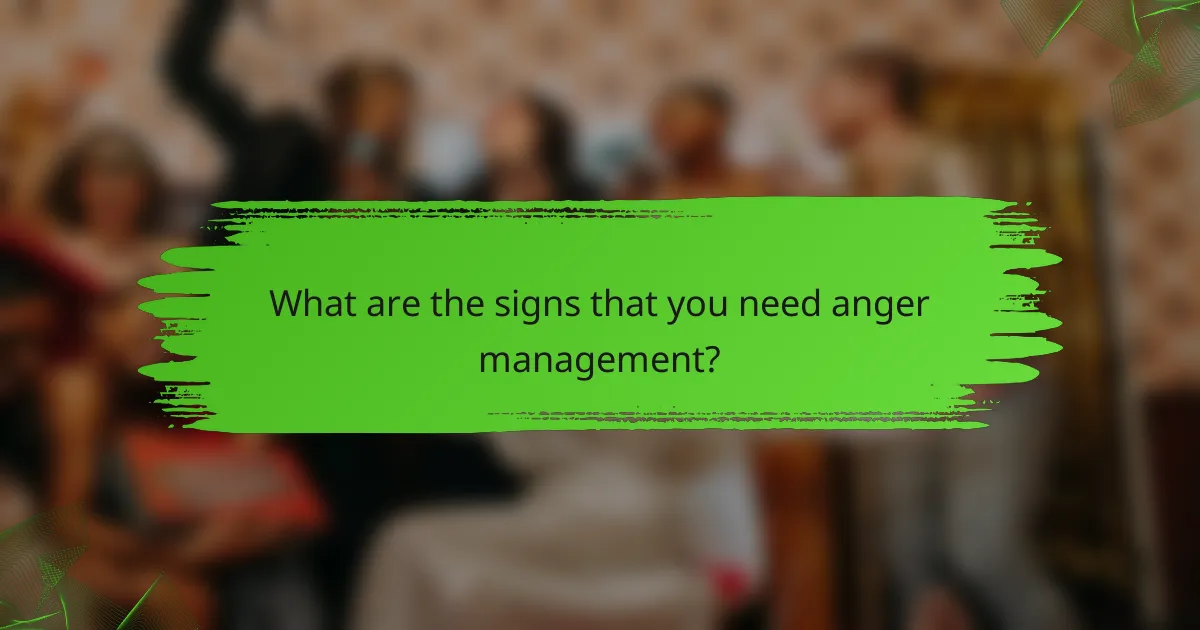
What are the signs that you need anger management?
Recognizing the signs that you need anger management is crucial for maintaining healthy relationships and emotional well-being. Common indicators include frequent outbursts, physical aggression, and emotional distress, which can significantly impact your life and those around you.
Frequent Outbursts
Frequent outbursts are a clear sign that anger management may be necessary. If you find yourself losing your temper over minor issues or reacting disproportionately to everyday frustrations, it’s time to assess your emotional responses. These outbursts can strain relationships and lead to feelings of guilt or shame afterward.
To manage this, consider keeping a journal of your triggers and responses. Identifying patterns can help you develop coping strategies and reduce the frequency of these emotional explosions.
Physical Aggression
Physical aggression is a serious indicator that anger management is needed. This can range from throwing objects to more severe actions like hitting or threatening others. Such behaviors not only endanger your relationships but can also lead to legal consequences.
If you notice a tendency toward physical aggression, it’s essential to seek professional help. Techniques like deep breathing, time-outs, or physical exercise can serve as effective outlets for pent-up anger.
Emotional Distress
Emotional distress is another sign that you may need anger management. Feelings of anxiety, depression, or overwhelming frustration often accompany uncontrolled anger. These emotions can create a cycle that exacerbates your anger issues, making it harder to cope.
To address emotional distress, practice mindfulness or relaxation techniques. Engaging in activities that promote emotional well-being, such as yoga or meditation, can also help you manage your feelings more effectively.

How to choose the right anger management program?
Choosing the right anger management program involves evaluating the program’s credentials, understanding its treatment approaches, and assessing its success rates. A suitable program should align with your personal needs and preferences while being backed by qualified professionals.
Assessing Program Credentials
Start by verifying the qualifications of the program facilitators. Look for certifications from recognized organizations, such as the National Anger Management Association (NAMA) or similar bodies in your region. This ensures that the program adheres to established standards and practices.
Additionally, check if the program is licensed and recognized by local health authorities. This can provide peace of mind that the program meets specific regulatory requirements and offers a structured approach to anger management.
Understanding Treatment Approaches
Different programs may utilize various treatment methods, such as cognitive-behavioral therapy (CBT), mindfulness techniques, or group therapy. Understanding these approaches can help you determine which aligns best with your learning style and personal goals.
Consider whether the program includes practical exercises, role-playing, or educational components. Programs that offer a mix of theory and practice tend to be more effective in helping individuals manage their anger in real-life situations.
Evaluating Success Rates
Research the program’s success rates by looking for testimonials or reviews from past participants. Many programs may provide statistics on their effectiveness, such as the percentage of participants who report improved anger management skills after completion.
It can also be helpful to inquire about follow-up support or resources available after the program ends. Continuous support can significantly enhance the long-term effectiveness of anger management strategies learned during the program.
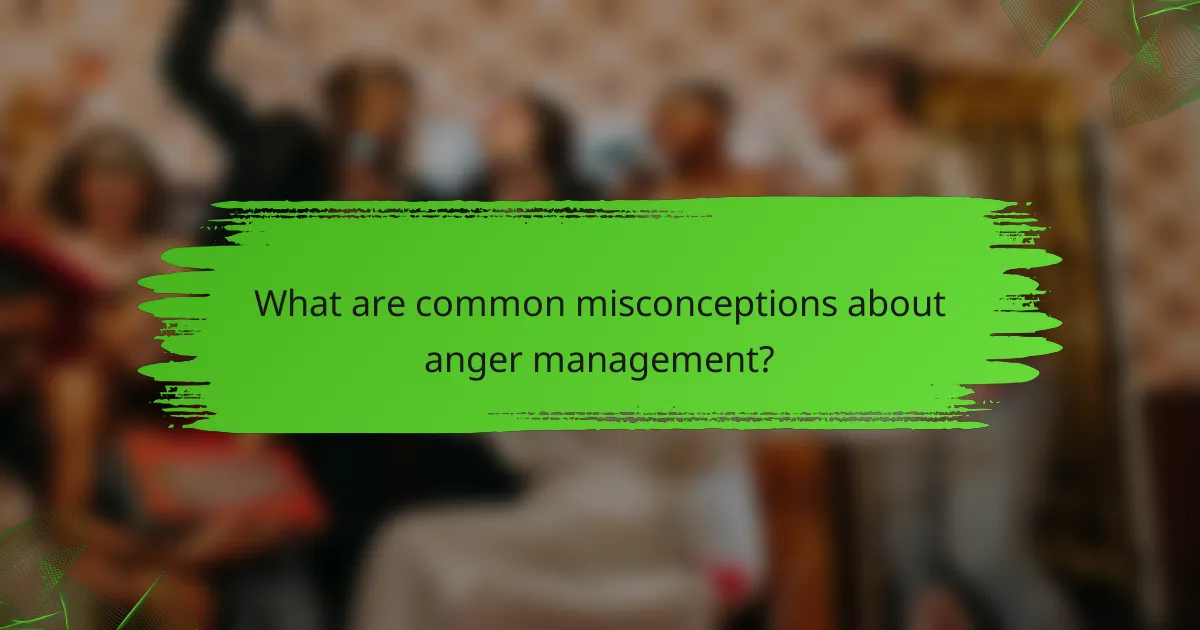
What are common misconceptions about anger management?
Many people believe that anger management is solely about suppressing anger or avoiding conflict, but it actually involves understanding and expressing emotions in a healthy way. Misconceptions can lead to ineffective strategies that may worsen the situation rather than improve it.
Anger is always bad
A common misconception is that anger is inherently negative. In reality, anger is a natural emotion that can signal when something is wrong or unjust. When managed properly, it can motivate positive change and assertiveness.
Anger management means suppressing anger
Some think that anger management requires them to bottle up their feelings. However, effective anger management focuses on recognizing and expressing anger appropriately rather than suppressing it. Techniques like deep breathing or talking about feelings can help channel anger constructively.
Only violent people need anger management
Another misconception is that anger management is only for those who exhibit violent behavior. In truth, many individuals who experience frustration or irritation can benefit from anger management techniques. Learning to manage anger can improve relationships and overall well-being for anyone.
Anger management is a quick fix
People often believe that anger management provides immediate solutions to their problems. However, it is a process that requires ongoing practice and self-reflection. Developing effective strategies takes time and commitment, but the long-term benefits are significant.
Therapy is the only way to manage anger
While therapy can be beneficial, it is not the only method for managing anger. Self-help strategies, support groups, and educational resources can also be effective. Individuals can explore various options to find what works best for them in managing their anger.



